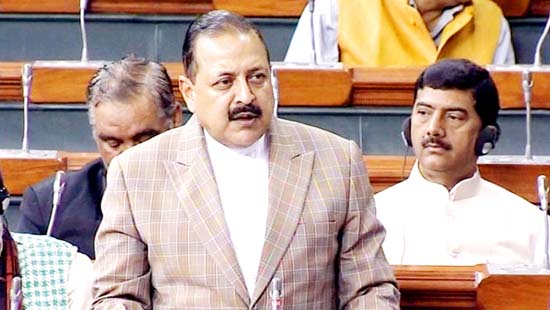Excelsior Correspondent
NEW DELHI, Dec 27: ISRO (Indian Space Research Organization) is providing Tele-Medicine facility in Jammu & Kashmir. This is a part of the satellite based Tele-Medicine project implemented by ISRO and gradually extended to several hospitals across the country, in due course of time.
This was disclosed by Union Minister of State (Independent Charge) of the Ministry of Development of North Eastern Region (DoNER), MoS PMO, Personnel, Public Grievances & Pensions, Atomic Energy and Space, Dr Jitendra Singh in reply to a question in the Lok Sabha today.
Pertinent to mention that ISRO based Tele-Medicine facility has been set up in certain Medical Colleges and other Hospitals in the State as also at SKIMS Soura. The authorities have been advised to use the facility adequately.
In his reply, Dr Jitendra Singh stated that, in addition to Jammu & Kashmir, several peripheral States and Union Territories have also been provided this facility, as a result of which, the eight States of Northeast, Andaman & Nicobar Islands and Lakshadweep islands have also been benefitted from it. As of now, about 130 Tele-Medicine centres are functional across the country through ISRO.
The major services provided under the ISRO Tele-Medicine programme, the reply stated, include regular Tele-consultations in General Medicine, Cardiology, Diabetes, Radiology, Ophthalmology, Neurology, Oncology, Women and Child welfare.
Not only this, Tele-Medicine facility is also being used for promoting Continuing Medical Education (CME) programmes for medical professionals in rural and remote areas, in order to help them update their knowledge.
As a measure of safeguard, according to the reply from Dr Jitendra Singh, the Tele-Medicine services are provided through well-trained professional doctors. Moreover, during Tele-consultation, the patients’ data and the treatment prescriptions are exchanged electronically using Tele-Medicine software which is based on international standards like “Health Level-7” (HL7) and “Digital Imaging and Communications in Medicine” (DICOM).
As a matter of maintaining records, the patient data and the treatment prescriptions are stored in Tele-Medicine servers. The doctors, including the specialists, follow the same set guidelines of medical practice while providing Tele-consultations as they normally do while providing in-person consultations.
Trending Now
E-Paper


